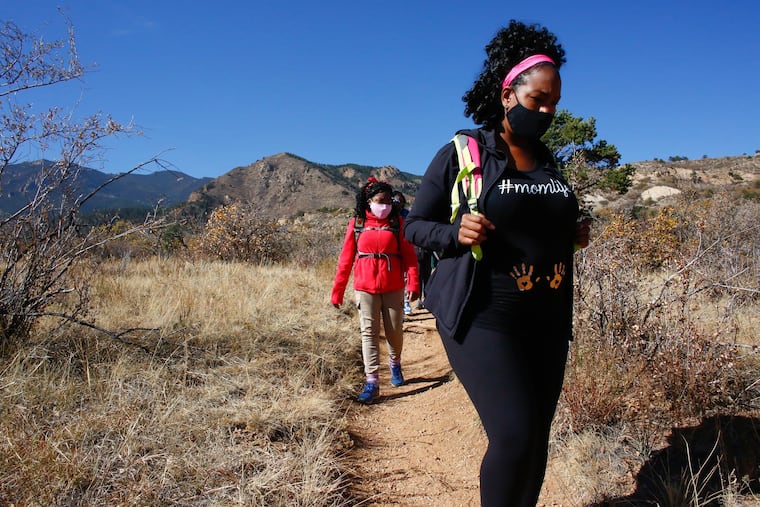Women who hike alone are aware of the risks. Please, they say, stop reminding them.
The recent disappearance of a York County woman on a trail has prompted discussions about women’s safety outdoors.

Women who hike alone are well aware of what can go wrong in the outdoors, mostly because people won’t stop reminding them.
“People generally mean well so I try not to get mad about it,” said hiker Gina Diorio, 43, of Chester County. “It’s a shame to miss opportunities because of fear.”
The recent disappearance of a York County woman on a rail trail there have prompted the age-old “women-shouldn’t-hike-alone” debates to resurface on social media. During past debates, suggestions range from carrying mace and handguns, to finding a group or partner, to borrowing a neighbor’s dog.
“I hike a lot by myself, and my wife worries about me,” one man wrote in a Facebook post about the subject. “I certainly wouldn’t want my wife hiking alone ... too many weirdos.”
Danielle Williams, editor of Melanin Base Camp, a group that aims to increase ethnic minority and LGBT participation in the outdoors, said incidents like the disappearance of Nicole Ebaugh or attacks in the outdoors often result in chastising women for hiking alone and asking them to modify their behavior.
“In reality, we should be teaching men not to rape, kill, or assault women,” Williams said in an email. “All the pepper spray in the world won’t keep women safe as long as we continue to reproach victims for ‘not being safe’ instead of holding aggressors accountable for predatory and misogynistic behavior long before they commit their first assault.”
Authorities in York County have said they don’t believe the 29-year-old Ebaugh was a victim of foul play, but she hasn’t been seen since Saturday, when she parked her car at the Heritage Rail Trail. Search-and-rescue teams and volunteers have scoured the area for Ebaugh. A woman was raped on the trail last year; a man was convicted for that crime and remains in prison.
Tracy Antonioli was on her way to the Delaware Water Gap Thursday morning, alone, because that’s the way she prefers it. She recently posted about hiking solo on a Pennsylvania Facebook group, citing a 2015 Backpacker Magazine article that found women’s chances of being a victim of crime are far lower in the outdoors, such as national parks, than anywhere else.
“The least-safe place for a woman is in her house,” said Antonioli, a Lehigh Valley avid hiker.
Besides, she said, bad things can and do happen to anyone.
“It’s funny, do they think men are unbreakable? Do bad things only happen to women in the outdoors?” she said.
Hiker Deirdre McPhillips said she’s taken solo trips all over the state and has hiked the York County rail trail. She said Ebaugh’s disappearance has her “shaken a bit.”
“I definitely will be keeping my eyes open a lot more and I am considering the pepper spray,” McPhillips said in an email.
Joe Neville, executive director of the Keystone Trails Association, said incidents like Ebaugh’s disappearance are “relatively rare.” He shared a list of safety recommendations from outdoor retailer REI, including keeping headphones at home and the time-honored tradition of letting someone know where you’re going.
The 2015 Backpacker article about women’s safety in the outdoors said men more often require rescue, and women are more likely to survive accidents. “Culturally, females tend not to do as many of the idiotic things that solo males do. Males are more likely to try to pick up a rattlesnake,” a search-and-rescue expert told the magazine.
While hiking with a group or partner is safer for all the obvious reasons, solo hikes in the outdoors are a way to go inward as well. Yet for female hikers of color, like Williams, the undercurrents of racism in rural areas often make peace difficult to find.
“I have been hiking alone as a disabled Black woman for a few years now. I am a full-time elbow crutch user. My No. 1 concern on the trail isn’t wildlife or accidental injury, it’s other hikers who don’t think I belong or who think I’m an easy target,” Williams wrote. “As a result, I often feel hypervigilant on empty trails instead of meditative or appreciative of nature. It doesn’t mean that I’m going to stop hiking alone. It does mean that I feel uneasy parking at a deserted trailhead.”
Debbie Njai, who founded Black People Who Hike after her first trip in 2019, said she tries to bring her dog, Brownie, on every hike.
“I wouldn’t tell someone new to hiking to go out by themselves for the first time,” she said. “There’s things I would recommend for any solo hike, like a fully charged phone and the AllTrails pro mapping app. That goes for men or women.”
Erika Morgan, 35, said she hikes alone often along the Wissahickon and carries mace for protection. Her husband came with her, initially, when they moved to Mount Airy from South Philadelphia, to get a lay of the land.
Morgan said she’s hiked solo through the winter.
“I’m so bundled up out there that people think I’m a man,” she said. “But they move out of the way more, so I don’t mind.”